
The City updated the Centennial Park Master Plan in 2021 to guide decision-making around improvements, programming and management of the park. The first phase of improvement projects includes an improved playground and new waterplay area; hubs for soccer, baseball and cricket that will include new fields and supporting facilities; a new skate trail with an updated chalet; and improvements to the existing trail network.
While we aim to provide fully accessible content, there is no text alternative available for some of the content on this site. If you require alternate formats or need assistance understanding our maps, drawings, or any other content, please contact Mark Goulart at 416-395-0163.
Based on the International Association of Public Participation Spectrum:
Meeting summaries will be posted as they become available.
Part of the traditional territory of the Anishnabeg, the Haudenosaunee and the Wendat peoples, Indigenous peoples have been stewards of the land that Centennial Park is situated on for at least 13,000 years. The land is also covered by Treaty 13 with the Mississaugas of the Credit First Nation.
The Indigenous Advisory Circle (IAC) is made up of 20 individuals who identify as Indigenous to Canada, and reflect a diversity of Indigenous experiences, backgrounds, and communities. The IAC will have an advisory role and provide valuable feedback on upcoming park improvements as part of the Master Plan, including opportunities for Indigenous Placekeeping.
IAC 1: June 13, 2024 - summary
The Stakeholder Advisory Group (SAG) is a panel of project stakeholders selected to provide advice to the project team based on their specific connection to a project, knowledge and/or experience. The SAG will meet virtually and in person five to 10 times a year, at key decision points throughout the implementation of the Master Plan to review and provide feedback and input.
This section provides progress updates on the work underway in Centennial Park. Updates related to community engagement can be found in the Community Engagement section.
Construction continues on the new baseball hub, volleyball courts and pickleball courts. At the baseball hub, landscaping activities and light pole installation are in progress. The volleyball courts have received their final layer of sand, and wooden beams for the nets and light poles have been installed.
Construction continues on the new soccer hub. Turf installation and surface irrigation testing are underway at the bubbled training site. The glass façade for the fieldhouse is nearing completion.
Construction continues on the new soccer hub. Work at the bubbled training site includes the installation of the irrigation system, perimeter fencing and light poles. The steel structure for the new fieldhouse is complete.
Construction continues on the new baseball hub, volleyball courts and pickleball courts. Fencing for the baseball diamonds is nearing completion. Underlay installation for the new pickleball courts is in progress, along with the placement of light poles to support future site lighting.
Construction continues on the new baseball hub, volleyball courts and pickleball courts. Infrastructure installation is progressing on the west side of the beach volleyball courts.
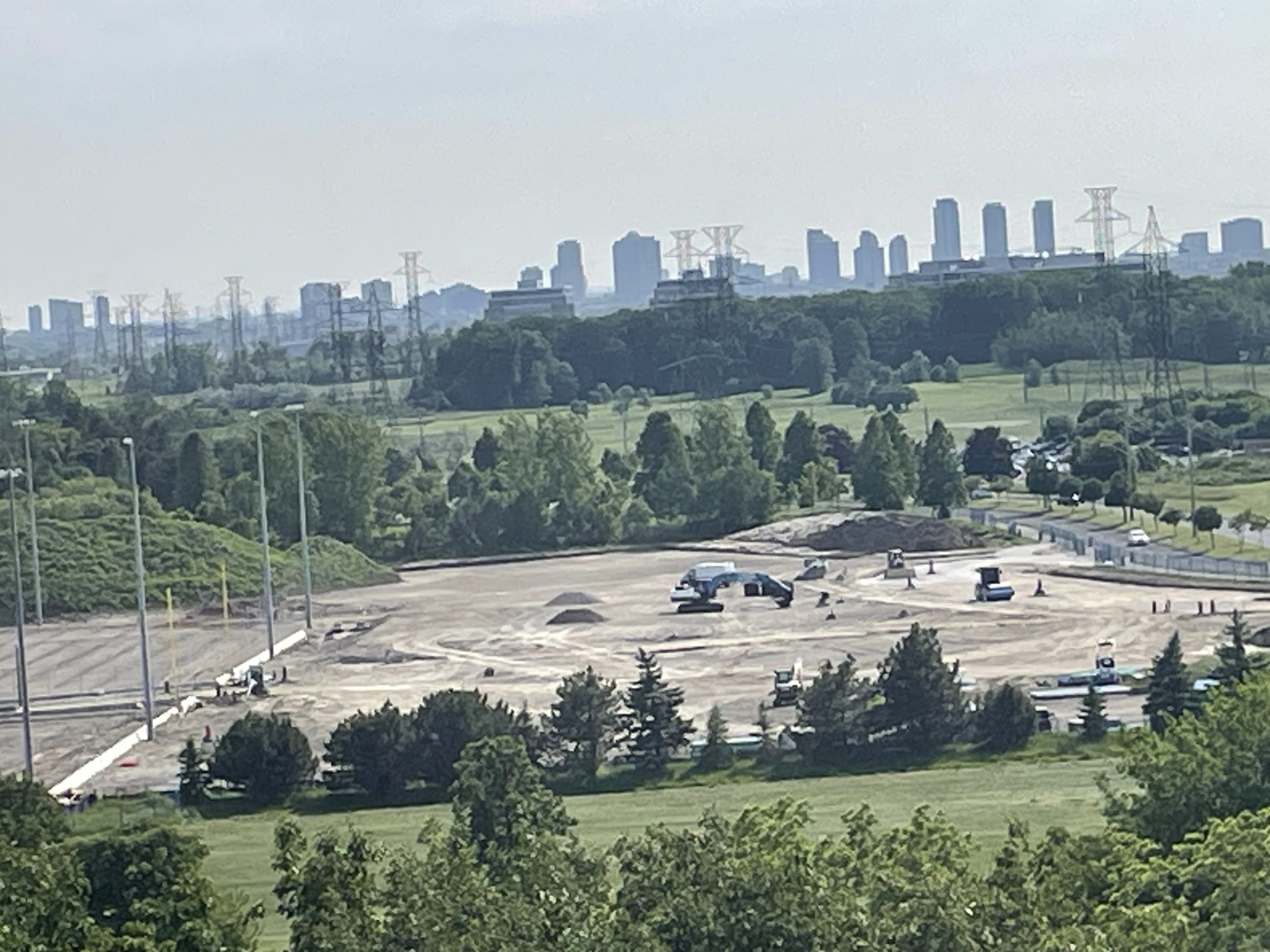
Construction also continues on the soccer hub, with foundation work underway for the new fieldhouse.
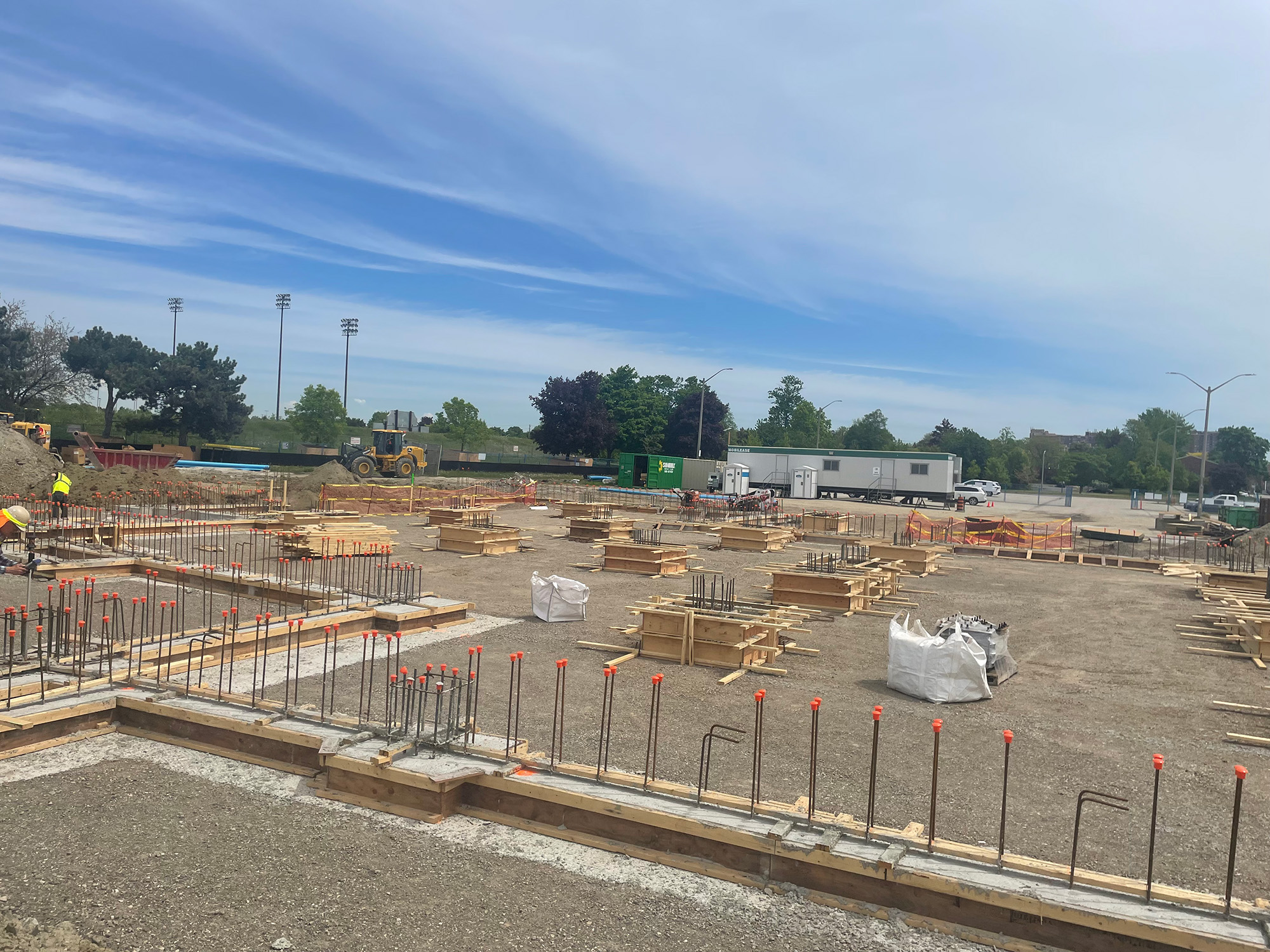
Construction of the new baseball hub, volleyball courts and pickleball courts is progressing. New fencing and storm sewer installations for the baseball diamonds are ongoing.
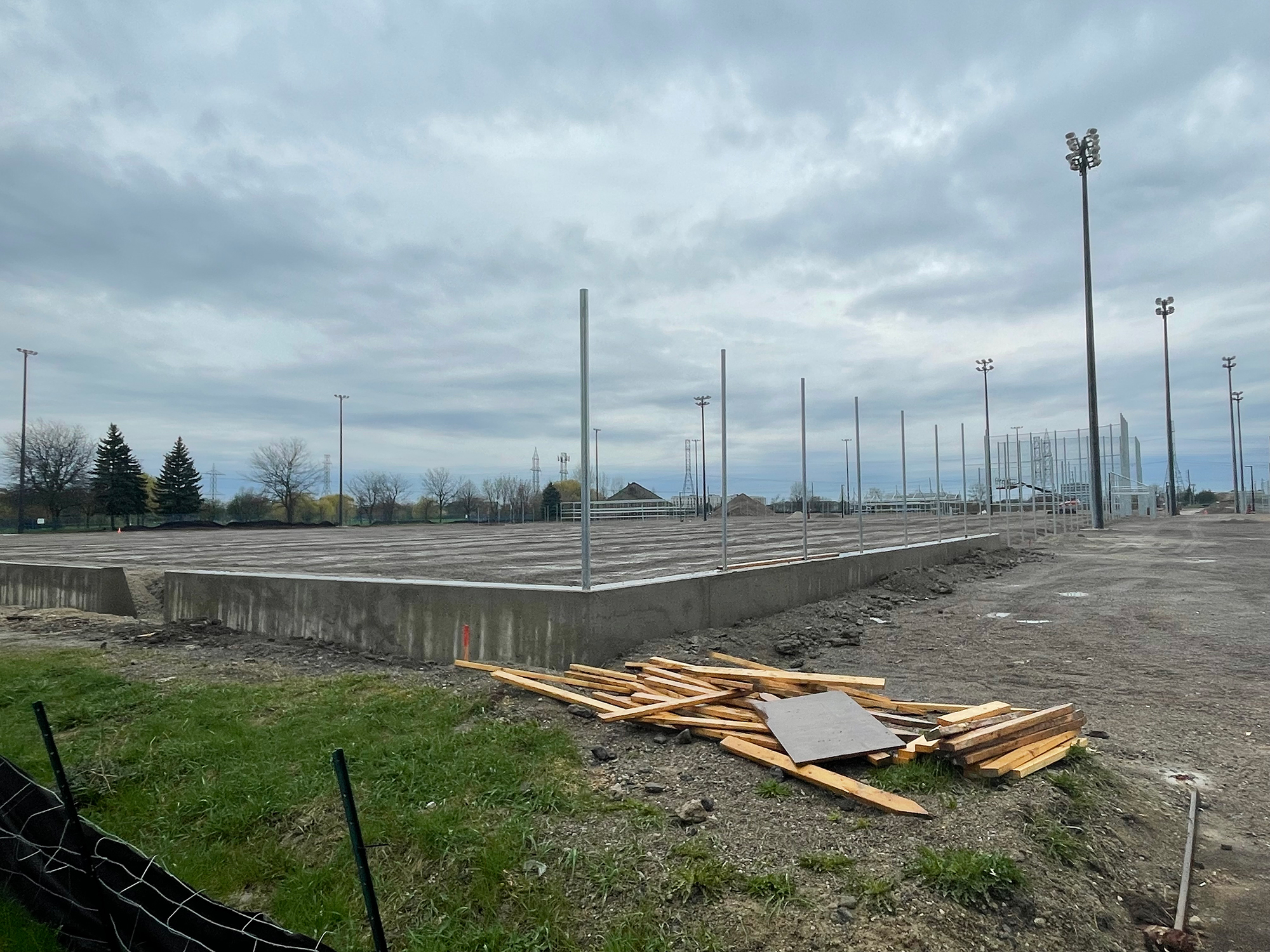
Construction continues on the soccer hub, with excavation for the new fieldhouse starting.
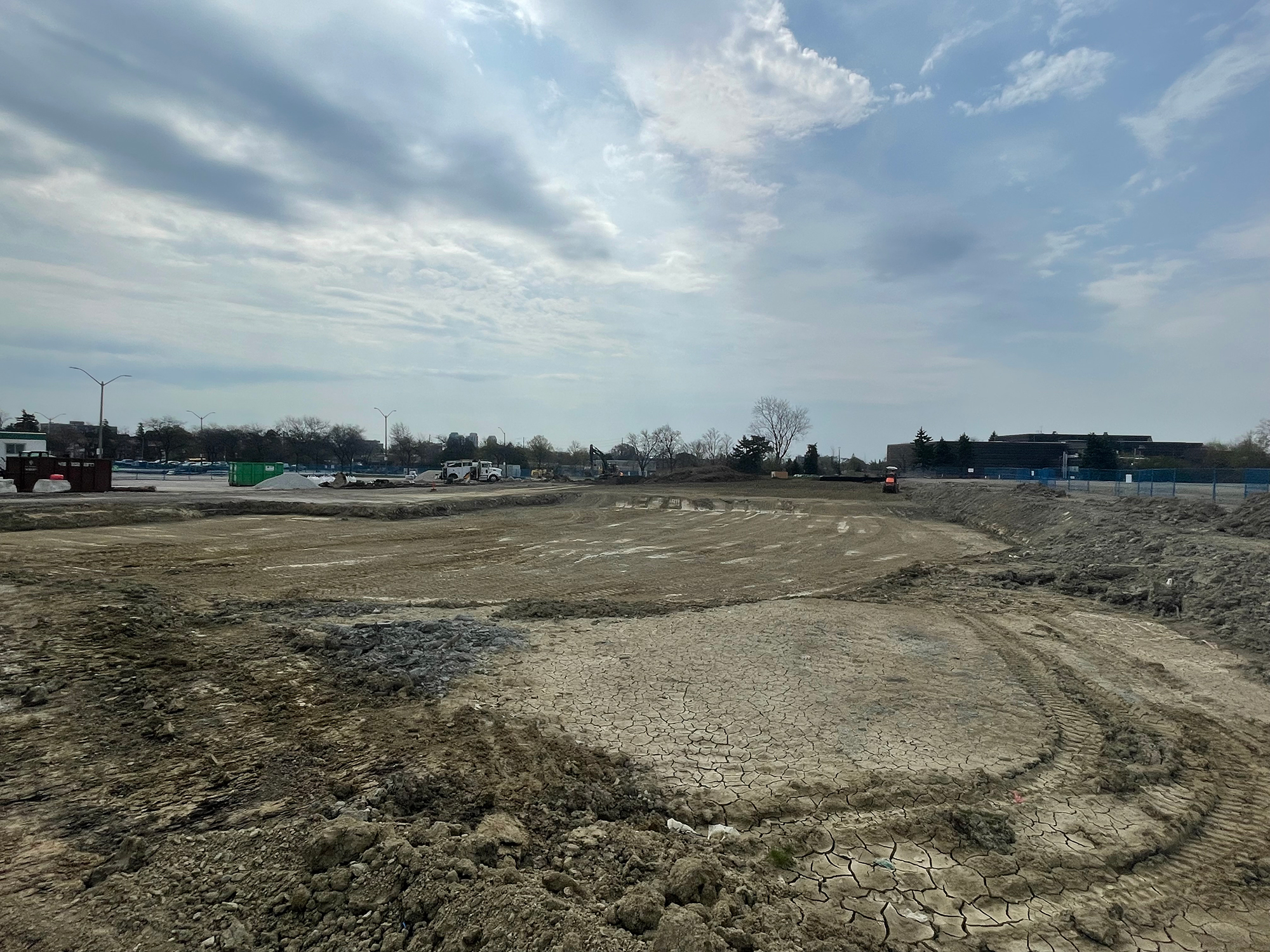
Construction of the new baseball hub, volleyball courts, and pickleball courts is ongoing. Current work includes site preparation, installation of new lighting and fencing for the baseball diamonds, and continued site servicing for the volleyball and pickleball courts.
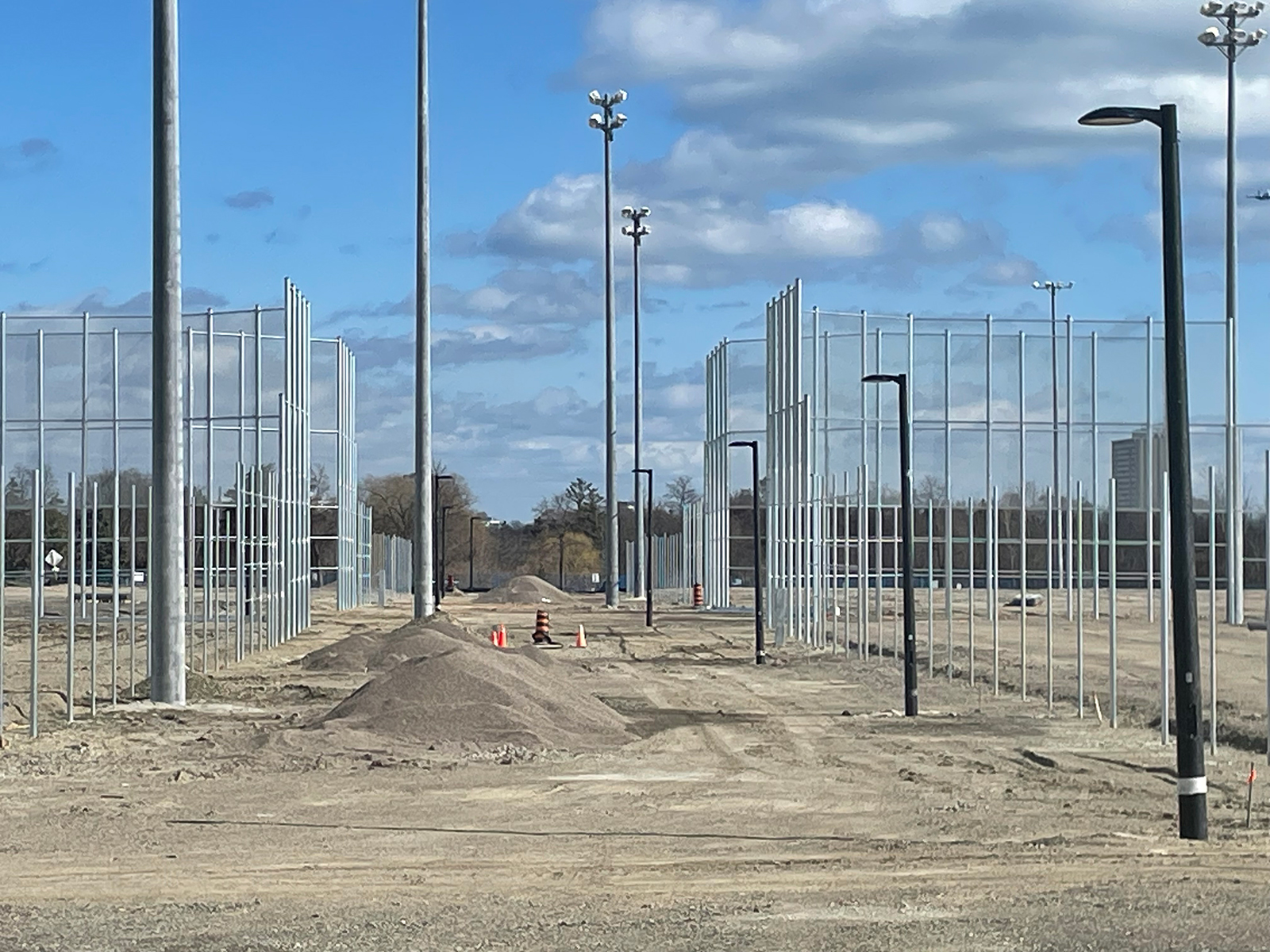
Construction of the soccer hub is also underway, with continued site preparation and site servicing in progress.
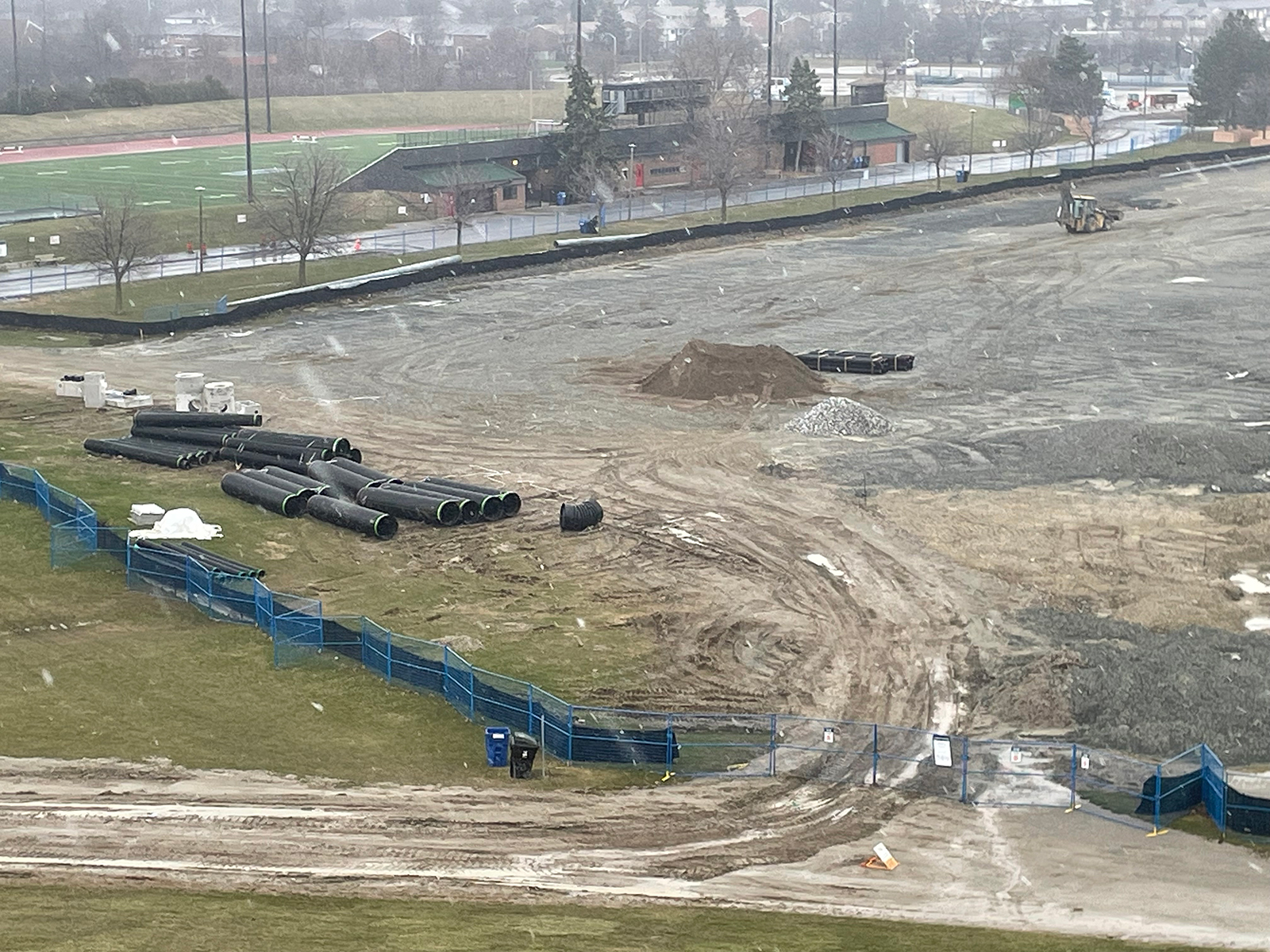
The new sidewalk on the east side of Centennial Park Road is complete. Construction has begun on the multi-use trail on the west side of Centennial Park Road.
Construction is also underway for new multi-use trails along Centennial Park Boulevard and Rathburn Road. These are expected to be completed by fall 2024.
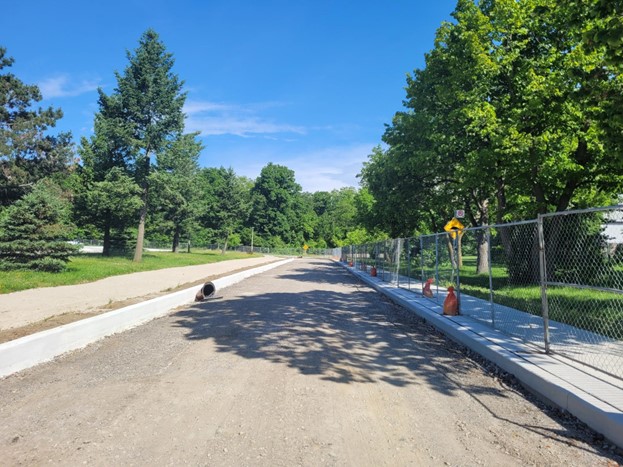
Construction is currently underway to update the Chalet’s north parking lot. Updates include new asphalt paving, planting beds to define parking aisles, drop-off zones, accessible parking stalls, and a new sidewalk connecting the Chalet to the newly constructed sidewalk on Centennial Park Road.
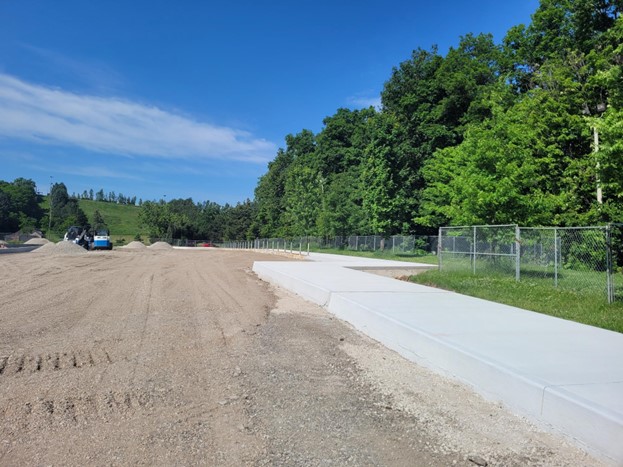
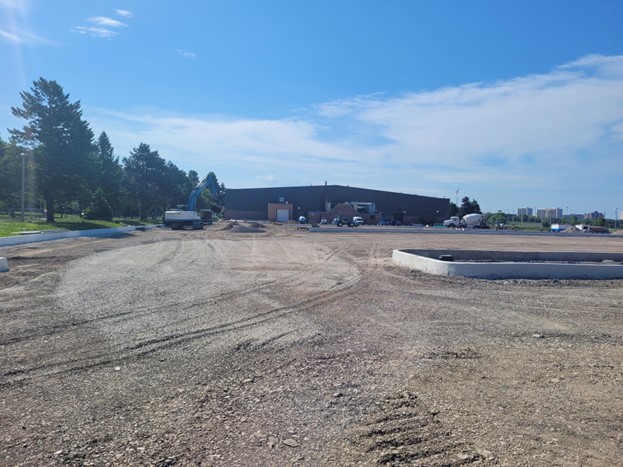
Construction continues on the new baseball hub, volleyball courts and pickleball courts. Site demolition and earthworks are underway to prepare for landscaping and final installation.
On June 26, a Virtual Public Information Session was held online from 6 p.m. to 7:30 p.m. Updates were provided on upcoming Centennial Park improvements, followed by a question and answer session.
Download the June 26, 2024 meeting presentation.
From May 21 to June 3, people who identify as Indigenous were invited to apply to be a member of the Indigenous Advisory Circle .
From March 27 to April 21, 2024, representatives of a local group, resident association, sports organization or community group/organization that use Centennial Park were invited to apply to be a member of the Stakeholder Advisory Group.
From January 10 to 29, an online survey received 1,015 responses about the new skate trail and Baseball Hub, including pickleball and beach volleyball courts. From January 5 to January 29, a separate online survey received 296 responses about the playground and water play improvements.
Download the January 2024 skate trail and baseball hub survey results.
On January 10, a Virtual Public Information Session was held online from 6 p.m. to 8 p.m. Approximately 100 community members attended. Updates were provided on upcoming Centennial Park improvements, and opportunities for further community engagement were presented. An interactive question and answer session followed.
Download the:
On January 26, a Virtual Public Information Session was held online from 6:30 to 8 p.m. Approximately 95 community members attended. An overview of the Centennial Park Master Plan, seven project bundles outlining upcoming Centennial Park improvements, and opportunities for further community engagement were presented. An interactive question and answer session followed.
Download the January 26, 2023 meeting presentation.
On November 25, the project team formed an accountability circle in recognition of the systemic anti-Black racism and barriers faced by Black communities when accessing parks. The circle brought together Centennial Park’s neighbouring Black communities and City staff to identify barriers and make recommendations on how these could be addressed. The circle also had the opportunity to make recommendations directly to the architect team to be included in the master plan.
Download the November 25, 2021 Accountability Circle Report.
On May 25, over 200 participants joined the Virtual Open House to learn more about the vision that will shape the future of the park. The online event began with a short presentation and opening remarks, followed by breakout sessions where participants reviewed site-wide strategies and demonstration plans and asked questions to the project team.
Download the May 25, 2021 open house presentation.
On November 30, a second meeting with Indigenous Community Leaders took place over Zoom and was led by Indigenous Consultant, Trina Moyan Bell. A summary report of that meeting will be posted here when it becomes available.
From September 25 to October 11, feedback on the preliminary designs that were developed based on feedback received through engagement to date was collected in an online survey. The survey received 1,000 responses.
Download the September 2020 survey summary.
On July 29, a digital workshop took place over Zoom and was led by Indigenous Consultant, Trina Moyan Bell. Indigenous Elder, Catherine Tammaro, opened and closed the workshop with a prayer. There were an estimated 15 participants including community leaders, elders, knowledge keepers, families and entrepreneurs.
Download the July 29, 2020 meeting summary.
On July 25, building on the Public Visioning Workshop findings, PROCESS and PMA led two virtual workshops to refine a park design.
Download:
On July 20, PROCESS and PMA led a virtual Stakeholder Advisory Committee meeting attended by six Centennial Park Stakeholders including local organizations, park permit holders, agencies, environmental groups, local schools and interested residents.
Download the July 20, 2020 meeting summary.
From June 21 to July 28, Social Pinpoint, an online interactive map platform, was used to collect specific feedback about the park from the community and park users. The platform allowed users to drop pins in specific locations as well as fill in a visioning survey on four themes: water, ecology, movement and culture.
A Public Life Study began in February to help the project team understand how people use Centennial Park. The study was paused in March due to the COVID-19 pandemic. The remaining Public Life Study data was collected through stakeholder and park user interviews from May to June.
On March 11, a workshop took place at Etobicoke Olympium to provide the public with an opportunity to learn more about the master planning process and to help create a community vision for the park. The workshop included a project presentation and visioning activities with the aim to discuss the opportunities and challenges of the Master Plan update.
Download:
On March 2, PROCESS and PMA led an in-person meeting at Etobicoke Olympium, which was attended by 25 Centennial Park stakeholders including, local organizations, park permit holders, agencies, environmental groups, school boards and interested residents, plus the consultant team and City staff.
On May 4, the 2008 Master Plan was presented and what we heard from prior internal and permit holder consultations. This was followed by a question-and-answer session.
After the presentation, smaller discussions took place around thematic displays for additional input and comments.
Following the Open House, there were two separate hike-shops led by City staff and PROCESS. These hikes focused on connecting participants with both natural and recreation areas in the park, which created dynamic discussions about real park amenities.
Download the May 4, 2019 meeting presentation.
On April 13, 2019, a workshop took place that included a review of the strengths, challenges and opportunities within the park.
The new Baseball Hub will be located in the southwest portion of the park, between Rathburn Road and Centennial Park Road. It will include four baseball diamonds that can be used for both softball and baseball, as well as batting cages. In addition, eight public volleyball and 12 pickleball courts will be built beside the Baseball Hub. All of these amenities will be served by a new fieldhouse with a year-round washroom building.
The timeline is subject to change.
The Centennial Park Master Plan Update included the creation of an expanded cricket hub to meet the demands of the growing sport in the city. The Master Plan Update identified the park’s hydro corridor as a location to create a Cricket hub, with two new cricket pitches being added to the existing two, as well as a new field house with a year-round washroom building.
The timeline is subject to change.
The pathways in the park will be upgraded with new surfacing to improve circulation and accessibility. The first phase of pathway improvements will take place along the perimeter of the park, which includes:
The second phase of pathway improvements will include interior park pathways which will include new surfacing and lighting.
To be implemented in phases in coordination with Hub projects.
The playground and wading pool in Centennial Park are being replaced with a new large playground and water play area with the help of community feedback.
Visit Centennial Park Playground and Water Play Improvements.
A new skate trail, as well as improvements to the existing chalet and surrounding area, are coming to the northeast side of Centennial Park. The improvements to the existing chalet building and exterior spaces will better accommodate a range of new programming and events anticipated in this area of the park.
The timeline is subject to change.
The new Soccer Hub will be located in the southeast portion of the park, between Elmcrest Road and Centennial Park Road. It will include a Venue Specific Training Site (VSTS) with premium turf that will be used as a training site for FIFA 2026, plus four additional new soccer fields. The Soccer Hub will also include a sports bubble, and a new fieldhouse with a year-round washroom.
The timeline is subject to change.
The Centennial Park Master Plan Update seeks to find a new balance between the natural environment and recreational facilities, addressing the existing fragmentation of the site and revealing unique features that should be cherished and preserved. The document outlines strategies that will be implemented over the course of 20 years.
Download the Centennial Park Master Plan Update:
Centennial Park is Toronto’s second-largest park, located in the west end, near the border of Mississauga. Centennial Park serves both the local community and the region, attracting an estimated 1.5 million people from across the Greater Toronto Area. The park contains many sports facilities, public gathering spaces and natural areas.
A Master Plan is a dynamic and long-term planning document that provides a vision, objectives and action items to guide decision-making for the ongoing improvements and management of parks. Master Plans are created using community and stakeholder feedback, expert advice and research. They are typically updated every 10 years.
In 2008, the City developed a Master Plan for Centennial Park that was not presented to City Council and therefore was not implemented. A lot has changed since 2008. The park itself has evolved with the addition of a BMX Bike Park, a frisbee golf course and other minor changes. The City has also created new policies and frameworks, including the Parkland Strategy and the Facilities Master Plan. In 2018, the City set out to review the 2008 Centennial Park Master Plan and create an updated plan.
The Centennial Master Plan addresses the impacts of climate change (e.g. building and park operations, impacts of severe storms) and focuses on serving a diverse set of both local and citywide residents. A focus on four major themes of Water, Ecology, Movement and Culture guides the Master Plan Update:
How we think about water at Centennial Park involves the entire water cycle – how and where it lands on the site, how it moves through the site, and how it is absorbed by the site. Water is a natural resource and it is also a source of play, beauty and contemplation within the park. The Master Plan takes into consideration the many ways water exists in the park.
The Ecology of Centennial Park includes the natural environment – the trees, habitats and animals – and the system that links all of these together. The Master Plan takes into consideration the delicate balance of the park’s ecosystem, including how to reduce human impacts and prepare the park for the changing climate.
Movement in Centennial Park is all about how people travel and find their way to and around the site. It is also about equal access for all, whether you are walking, biking, driving or taking the bus, or if you need to take breaks often or need a smooth surface to travel on.
Culture reflects everything that contributes to the way of life in Centennial Park. It includes sportsfields and playgrounds, picnicking by the pond or visiting the Conservatory on a rainy day. It captures the community at Centennial Park, and how it can be created, maintained and enhanced.
The Facilities and Service Planning Assessment identifies recommendations intended to inform the development of a Park Master Plan Update for Centennial Park. Specifically, this assessment examines and prioritizes recreation facility needs for Centennial Park, guided by the City’s Parks and Recreation Facilities Master Plan, including the current thinking around emerging recreation needs